This past weekend I played in Grand Prix Providence with Gaudenis Vidugiris and Zvi Mowshowitz. We finished in eighth place, which is decent but obviously not like a real Top 8 in an individual event. Today I’m going to explain how we did that, discuss problems with this tournament structure, and examine some possible solutions.
Building Team Sealed decks is always a challenge. Doing it with gold sets is easier in some ways because the gold cards provide some direction. If you have a lot of Rakdos cards, you’ll probably want to put red and black in the same deck so that those cards aren’t wasted, but that only gets you so far.
Our pool had a lot of good Rakdos, Orzhov, and Selesnya cards:
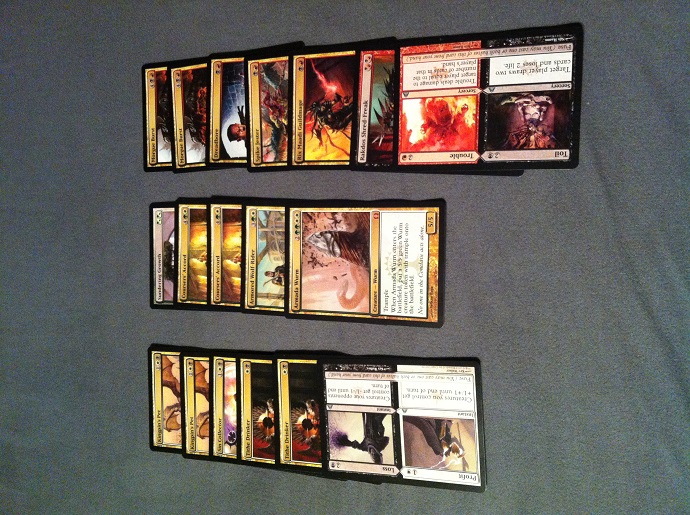
We knew that we’d like those guilds to be together. Our Rakdos cards and Orzhov cards were cheap and good early, so it would make sense for them to be in two-color decks that could consistently cast them early. Armada Wurm was possibly our most powerful card and has very strict mana requirements, so it also wanted to define the primary colors of a deck.
The next step was to look at our Guildgates:
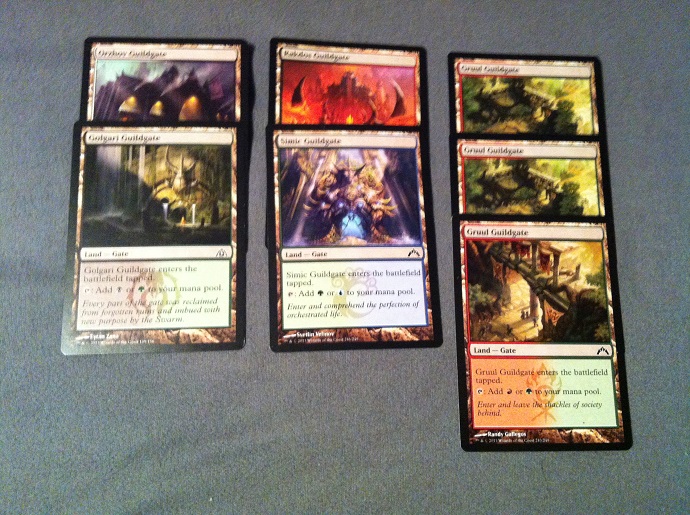
We had a lot of Jund Guildgates, so we thought it might be reasonable to try to build a Jund deck with all the Gates that could use Gatekeepers. We started building Jund, Orzhov, and laying out our blue to see what color it could be played with since we had to play Sphinx of the Chimes and Cyclonic Rift.
It immediately became apparent that Jund had too many cards, so something had to go. Also, we didn’t find a great fit for blue.
I don’t remember if we looked at anything else first, but eventually we realized that we could put our Orzhov and Selesnya cards together and build a Junk deck, a Rakdos deck, and an Azorius deck. Because of our Gates, Rakdos could easily splash green or Junk could easily splash red. Our Rakdos deck had plenty of cards, and the red splash in Junk let us use Warleader’s Helix and Armed // Dangerous, so that was the split we went with.
I played the Gate deck:
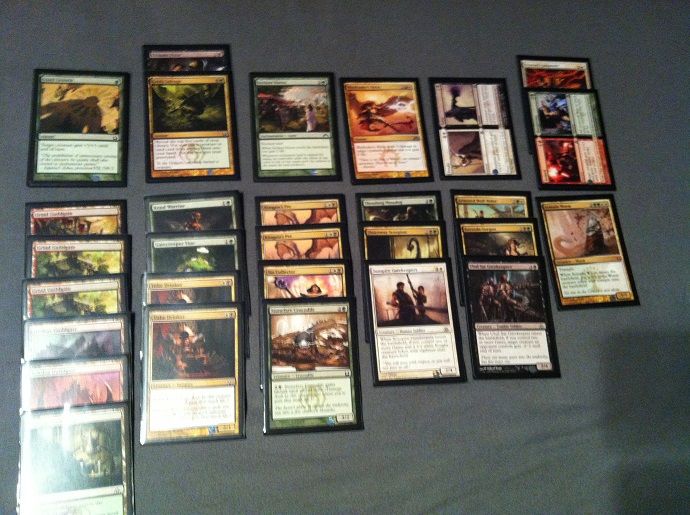
Gau played the Rakdos deck:
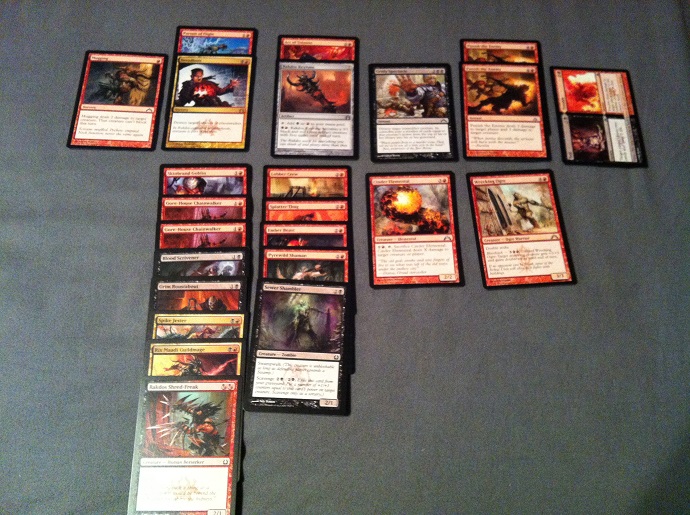
And Zvi played the Azorius deck:
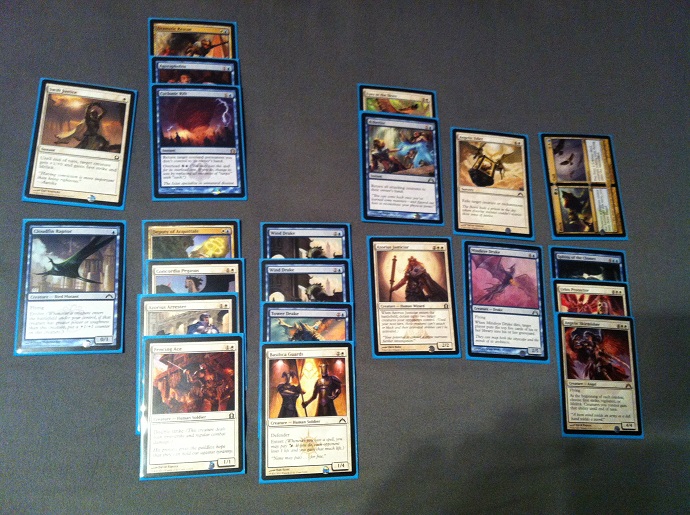
There are few ways to distribute the decks. Some people try to figure out which kinds of decks are going to be common in each seat and metagame appropriately. Another option is to just give everyone the deck they like most or are most comfortable with.
The metagaming option always sounds absurd to me, but here are some ways I’ve heard people try to think through it:
Reasoning 1: Most teams will put their best player in the B seat so that that player can help both of the others. They’re also likely to give the hardest deck to play to their best player, so the "weird deck" will usually be in the middle and the focused decks will be on the sides.
Reasoning 2: Most teams will put their fastest deck in the middle so that their B seat can finish rounds quickly and help the other two. This reasoning is deeply flawed because any player who finishes a match can just move their chair between the other two matches to help both players.
In general, I think the first line of thought makes a bit of sense, but I think the correlation is going to be fairly loose and would rather just give people the decks they’re comfortable with. I think my best strength relative to my teammates is sideboarding, and while I liked the sideboards of both of the other decks and felt they had a good amount of play, I thought it was most important that I play the multicolor deck to maximize its sideboard. All of us thought it looked like the kind of deck I’d be most comfortable playing.
Gau and Zvi battled to figure out who was more apathetic about which of the other decks to play, and in the end I’m not exactly sure how they decided. It’s possible that the thinking was that the weird deck would be in the B seat and that deck would be likely to have Gatekeepers. Azorius wanted to play against those, and Rakdos didn’t. I’m not sure if that was how the decision was made, but it wouldn’t have been unreasonable.
As the day went on, I sleeved every card I thought about using in my sideboard. I ended up sleeving a pretty impressive stack of cards, all but one or two of which actually made my deck at some point:
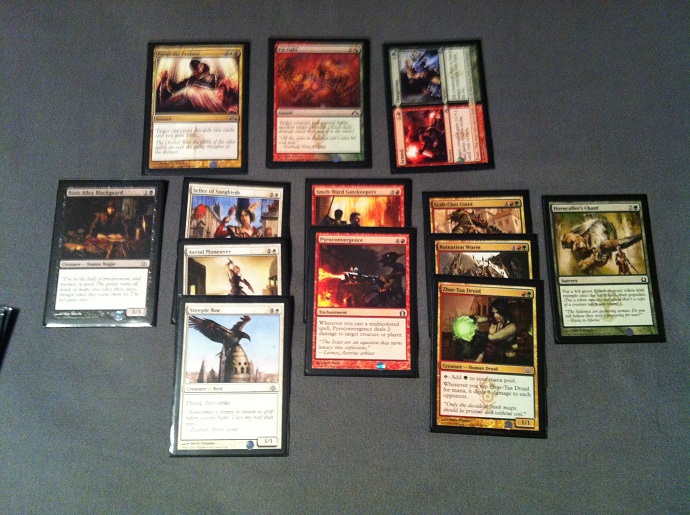
Team Sealed was awesome, and I had a lot of fun. There were some good matches played. There were a few where I felt like I made particularly good decisions, some where I felt my opponents made very bad decisions, times when I got extremely lucky, and others when I got extremely unlucky, but all in all I really doubt anyone wants to read any details about what happened in some specific games of Team Sealed.
We made the cut at 7-2 and then won the tenth round (apparently the nine round day 1, six round day 2 cap isn’t in effect for team events or something) and started day 2 at 8-2.
Now it was time to finalize our drafting strategy. We’d previously discussed the advantages of having everyone on the team have some particular assignment or role they were playing in the draft. We did a practice draft where I was supposed to take every Guildgate I saw and my teammates were supposed to try to avoid them and avoid Gatekeepers and know that I could probably cast anything. We also talked about assigning each of us certain colors to avoid in an effort to avoid fighting with each other. In the end, we decided that it was too important to be flexible while drafting and didn’t go with any strict rules, but we did try to talk about our general preferences so that we could have some idea about what might be going on and make sure that we weren’t all planning to first pick Viashino Firstblade over everything, for example.
We also knew that in day 2 one of the most important things would be to avoid splitting any drafts since that’s much worse for both teams than one team winning both matches, so we asked the head judge what kind of agreements were legal. He ruled that it was collusion to agree to concede a match that wasn’t in progress or to base the results of a match on anything other than that match itself, so we couldn’t make deals in advance. After he was told that this was different than the ruling given at previous team GPs, he said he’d look into it and announce a final rule in the morning but that he was unlikely to change his mind.
By the time he made the announcement in the morning, some teams that had just assumed it was legal because they’d played in previous events had already agreed that the team that won the first round would also win the second round, but we hadn’t because we knew it likely wouldn’t be allowed.
When we found out our first round opponents had made the cut at 7-1-1, lost the tenth round, and were now 7-2-1, we hoped that if we beat them, which would knock them out of Top 8 contention while leaving us very much alive for Top 4, they would concede anyway, but I doubt any of us thought that was very likely.
I drafted a deck that I liked a lot except that it really needed early red, white, and blue mana. I had four Gates, but that still only left me with seven sources of each of my colors, so I’d have to get a little lucky. Unfortunately, I lost the deck, so I can’t include a picture, but I had:
1 Cloudfin Raptor
1 Boros Elite
1 Wojek Halberdiers
2 Deputy of Acquittals
1 New Prahv Guildmage
1 Nivix Guildmage
1 Goblin Electromancer
1 Frostburn Weird
1 Skyknight Legionnaire
1 Sunspire Griffin
1 Firemane Avenger
1 Opal Lake Gatekeeper
1 Nav Squad Commando
2 Ethereal Armor
1 Pursuit of Flight
1 Hold the Gates
1 Gleam of Battle
1 Mizzium Skin
1 Warleader’s Helix
And two cards I don’t remember. My sideboard had a Pyroconvergence, a Cackling Perimeter, a Maze’s End, and some counterspells in case I played against a deck with a lot of removal (I would cut my enchant creatures).
We won the first match, couldn’t convince our opponents to concede the second, and lost. At X-3, we knew it would be devastating to split another draft, so I went back to the head judge to ask exactly what we were allowed to say.
The head judge knew that I was trying to find legal code to make an agreement that wasn’t allowed and didn’t have a problem with this. The rule could have been "No, you just can’t talk about it. If we think you’re discussing the outcome of the second match before playing the first, we will DQ you," but that wasn’t the rule. Collusion rules don’t actually exist to prevent collusion; they exist to keep it quiet. I hate this system because I think it creates something of a shady "old-boys network" where people who can communicate and trust each other are in a better position that newcomers to tournaments who don’t know how to work the system. I wish everything could just be legal so that it would all be fair because friends will always reach understandings, but I get that that isn’t likely to happen.
Anyway, I verified that I was allowed to say to my opponents, "I just want to make sure that all of us understand that splitting these next two rounds would be horrible for all of us. As such, I want you to understand that if we lose the first match, we’ll be conceding the second match." Having said that, I asked again if I could ask my opponents if they wanted us to plan to play out the second match even if we lost since I figured at that point I gave them an opportunity to decline our offer and I could expect that that meant they would do the same. I got permission to ask that and again told my opponents that I had verified that I was allowed to ask and then asked them. It seemed that we were all on the same page before we played our second draft matches.
After this draft, I immediately apologized to my teammates when we sat down to build because my deck was comically bad. I first picked Punish the Enemy, and I got passed Far // Away and Zhur-Taa Druid. My teammates knew that Gruul was my preferred guild and that Zhur-Taa Druid was my favorite common, but I decided Far // Away was too powerful to pass in a team draft and took that. Zvi also knew that seeing a fourth pick Zhur-Taa Druid meant I probably wasn’t Gruul, and he could draft accordingly.
Third pick I took Blast of Genius, which felt like a reasonable start, but from there cards dried up quickly and I couldn’t find any fixing or anything to move into. I ended pack 1 with very few cards I wanted to play. I was optimistic about getting rewarded in pack 2 though. Unfortunately, the first few packs didn’t happen to have any good Dimir cards, and while I got a late Bane Alley Broker, overall the second pack also went terribly. I was at around fifteen playables going into the third pack, which is really short, and I still had no fixing. I was in real trouble. The third pack went about as expected, which is to say not terribly well, and I felt like my deck was horrible.
It turned out that Gau had first picked Exava, Rakdos Blood Witch two to my right, passing Turn // Burn and Blast of Genius. My opponent took the Turn // Burn, and I took the Blast, so I was Grixis being fed by Rakdos and Izzet. To make things worse, the opponent passing to me also happened to be in black, and five players at the table were in black. Given this, it was no surprise that my deck was bad, but it also turned out that no one had particularly good decks since we’d all been fighting.
Talking about it with my team after, I realized that I should have just taken the Zhur-Taa Druid. Far // Away is good, but this way I would have avoided putting myself where my opponent expected me to be and I’d be staying on plan and drafting what my teammates thought I’d be most likely to be playing. Also, I could be pretty sure that my opponent would have the Far // Away, and I could consider hating appropriately. In general, it was determined that I should be pretty willing to take the second best card in the pack second pick.
I was left with this:
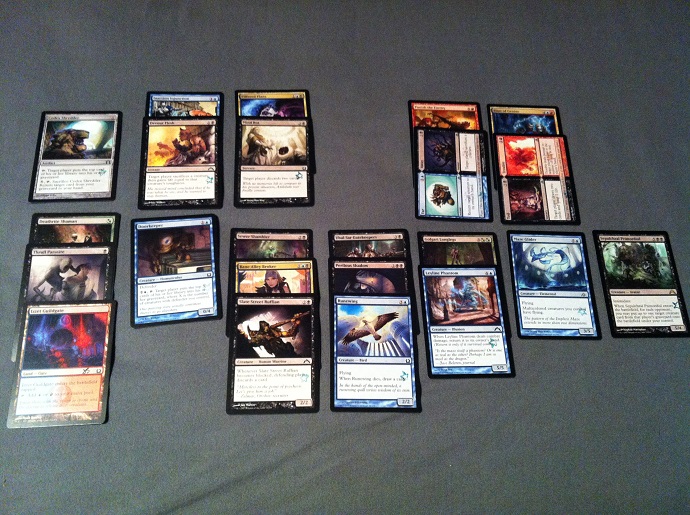
I played a Grixis mirror (I’m pretty sure it was against the player who was passing to me), and in game 1 with a full hand and six lands of all of his colors, my opponent conceded to my board of Codex Shredder, Doorkeeper, Slate Street Ruffian, Deathrite Shaman, and Maze Glider. I had no idea how that amounted to an unstoppable offense and was very confused when he asked his teammate if he should just stop playing to avoid showing my any more cards. I couldn’t imagine what his hand might have been.
In game 2, he didn’t have black mana, but I’m not entirely sure how important that was to him. We got into a race with my Slate Street Ruffian and Sewer Shambler against his 2/2 fliers, and I had Far // Away to get ahead and drew Toil // Trouble to finish him off.
My team narrowly managed to win, and our opponents conceded the next match.
In the final draft, we were paired against a team from New York who we knew, so we were sure it would be easy to agree that the winner of the first match won the second without saying too many words.
In this draft, I first picked Flesh // Blood, one of my favorite rares, and then felt like I had to take Sire of Insanity over Zhur-Taa Druid. It was unfortunate to pass Zhur-Taa Druid while planning to draft Gruul, but Sire of Insanity is just too good.
In the end, I ended up with a pretty good Gruul deck splashing Sire of Insanity. The second pack didn’t go especially well for me—an early Ruination Wurm was my only real Gruul card—but I got so much removal in packs 2 and 3 that I felt like my plan of big creatures and removal would work pretty well.
I played:
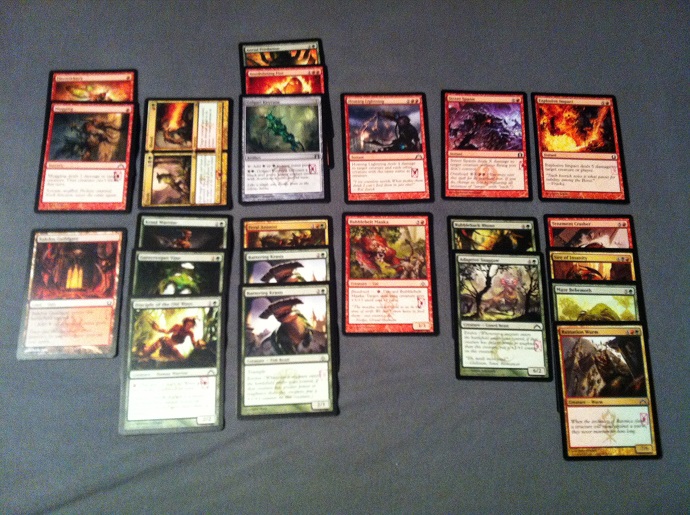
And it worked well enough to win my match.
Gau lost his, and Zvi played an extremely long game 1, which he lost, and then won the second, leaving them with just under three minutes for the third game. Zvi and his opponent played as fast as possible while the rest of us discussed what would happen in the event of a tie. Somehow, Zvi managed to win on turn 5 of extra turns, and the discussion was moot.
They conceded the last round, and we were left waiting to see if we’d finish in eighth or ninth. I believe we would have finished ninth, but a match ahead of us went to a draw, so we managed to sneak into eighth place.
Overall, playing with a team is awesome and I love Team Sealed, but day 2 was as miserable as I expected it to be.
Tournaments are based on a Swiss pairing system with a cut to elimination rounds. This system doesn’t work when you don’t use a Swiss pairing system, and playing two rounds against the same opponents isn’t Swiss. Collusion isn’t strictly mandatory, especially at the top tables where splitting isn’t necessarily bad, but overall I think I’d have a better chance of winning a tournament if I knew that all of my opponents were very good players who I knew I could make the obvious agreements with than if all of my opponents were bad but I couldn’t make any agreements with them. A random distribution of wins has you splitting half the drafts, and skill can only make that so much better. A tournament where I’m hoping to get paired against more difficult opponents only because it will make me more likely to win is really bizarre.
The result of this structure is a lot of stress about worrying about communication and how to properly collude, then playing a round, and then waiting around for an hour for no reason.
Obviously, players could just not do this, but you can’t give a group of gamers this incentive structure and expect them to just ignore it. This system absolutely has to change.
My preferred solution is just to play entirely Team Sealed since I think that format is great. Even if a tournament structure could be built that allows for enough drafts to find a winner, I think the fact that signaling is illegal but unenforceable is a very real and significant problem that no one is seriously trying to address.
That said, my solution is unpopular. People are really attached to the idea of drafting at team Grand Prix, and the structure is definitely a bigger problem than the signaling issue (that one just bothers me because I don’t like systems that reward cheaters and have absolutely no chance of catching or punishing them).
I know that there are a lot of ideas floating around. Drafting with more than six players in a draft has been suggested, but I think all those solutions are bad. It just stops feeling like a team tournament, and it also stops resembling a format people ever play outside of the tournament itself, which makes it less interesting to watch—or play for that matter. I think this was one of the big problems with Rochester.
Personally, I think that the solution has to be to just play one match per draft. I know there are people who don’t like that because what they really want is a "money draft GP," but I just don’t think that’s realistic. I think if it’s one match per draft, you can fit four or five drafts on day 2 (almost certainly only four, but they currently allow way too much time for registration and deckbuilding, so there’s some chance we could get another in).
From there, I think a match win should be worth four or five points instead of three. This allows teams to catch up from behind during day 2 and also creates a wider distribution of match points because everything isn’t just a multiple of three so different places are more likely to be determined by different numbers of match points rather than by tiebreakers. The finals should be a regular best of nine team draft.
Ultimately, there are a lot of different changes that could be made, and each of them has its own problems. It’s not possible to make everyone happy, but I really hope this is the last tournament that happens with the current structure.
Thanks for reading,
Sam
@samuelhblack on Twitter
